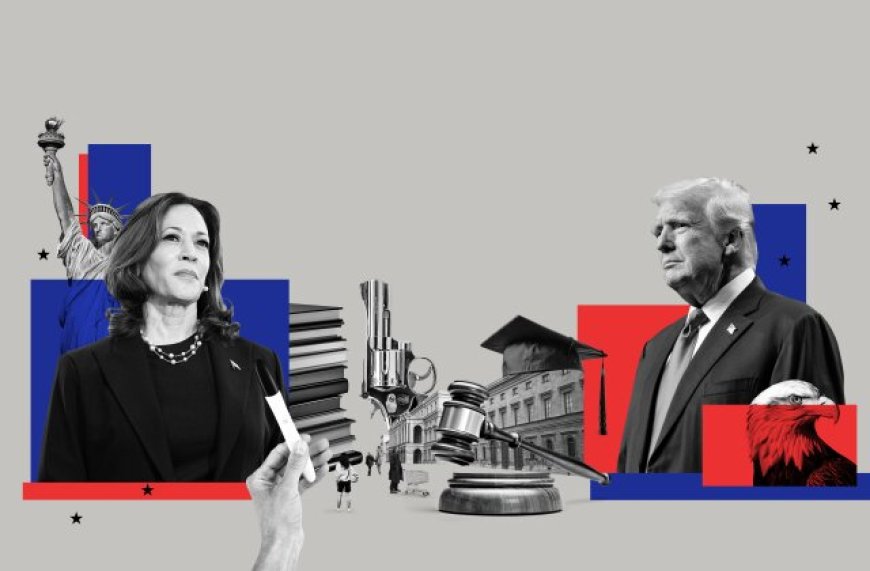The Economic Crossroads of 2024: Kamala Harris, Donald Trump, and the Future of the US

By: M. Sharifi
As the 2024 U.S. presidential election draws near, the economy and inflation dominate the national conversation, emerging as decisive factors for voters. Recent polling data from ABC News and Ipsos underscores this reality:88% of voters are prioritizing the economy as they cast their votes, while 85% are similarly concerned with inflation.
These figures reflect the immense weight these issues carry, shaping the electorate’s decision-making process as both parties scramble to present themselves as the solution to an uncertain economic future.
The State of the American Economy: Indicators of Concern
Delving into key economic indicators, the landscape appears turbulent. The unemployment rate, which had shown signs of stability earlier in the year, is once again on the rise. Historically, such increases have foreshadowed recessions, suggesting that economic recovery is far from assured. Interest rates, for instance, remain elevated—by some estimates, they may be a percentage point or two too high—casting a shadow over the broader economy.
Additionally, the yield curve has inverted, with long-term treasury bonds yielding less than short-term bonds, a classic harbinger of economic downturn. Yet, despite these alarming signals, the U.S. economy appears to be experiencing more of a gradual decline than an abrupt collapse. Since the unemployment rate reached its low point in April 2023, high interest rates have steadily cooled the labor market, which, in turn, has dampened wage growth and suppressed consumer confidence.
Economic Interventions: Harris and Trump Respond
The economic instability is such that both leading candidates in the 2024 election—Vice President Kamala Harris and former President Donald Trump—have shifted their focus toward economic policies aimed at easing voter concerns. Harris, with her current role in the administration, has vowed to tackle rising prices, framing her approach as one that prioritizes working families and seeks to stabilize the markets. Trump, on the other hand, has taken a more aggressive stance, blaming immigration for job losses and promising drastic measures, including mass deportations, to ostensibly create new job opportunities.
While Harris' proposals reflect a pragmatic approach to an undeniably challenging economic environment, Trump’s rhetoric veers sharply into populism, appealing to those who seek quick fixes to systemic issues. Unsurprisingly, Trump has branded Harris’s policies as "communist," warning that her economic interventions could spell disaster for the country. Yet, such language often belies the complexity of the situation, reducing intricate economic debates to soundbites aimed at rousing his base.
The Economic Perception Battle: Harris vs. Trump
Polling reflects the complicated dynamic at play. Many voters still remember the economic pains felt during the height of the pandemic and the inflation that has persisted throughout President Biden's term. Prices in grocery stores remain notably high, a source of constant frustration for American families. Inflation may be easing, but prices are still nearly 20% higher than when Biden took office—an economic reality difficult for many to overlook.
This lingering discontent has translated into mixed poll numbers. The Associated Press reports that 45% of Americans believe Trump would manage the economy better than Harris, who holds the confidence of 38% of voters. While these figures may seem troubling for Harris, they are far from definitive. Voter sentiment remains fluid, and economic performance, while central, is just one piece of a larger electoral puzzle.
Economic Anxiety: A Threat to the Democrats
The sluggish pace of infrastructure development and the volatility of financial markets pose significant threats to the Democratic platform as election season heats up. History shows that voters care deeply about the immediate state of the economy, often overlooking long-term achievements in favor of short-term conditions. A slowdown in real income growth, particularly in the months leading up to November, could spell trouble for Harris.
Further complicating matters is the uncertainty emanating from global events, including the war in the Middle East and stock market fluctuations. These external factors have the potential to exacerbate the already fragile U.S. economy, making the Democrats' task even more daunting. With voters focused on their immediate financial well-being, Democrats must work diligently to maintain confidence in their leadership.
The Economy: Not the Only Factor!
It’s essential to recognize that the economy, while critical, will not be the sole determinant of the 2024 election. Other issues—foreign policy, healthcare, immigration—will undoubtedly influence voter behavior. Indeed, despite a sluggish economy in 2012, Barack Obama was re-elected, demonstrating that strong leadership and clarity of vision can overcome even the most difficult economic conditions.
Harris, while facing formidable challenges, possesses a unique ability to navigate these turbulent waters. Her poise, experience, and progressive vision offer voters an alternative to Trump’s divisive rhetoric. In an election that promises to be one of the closest in recent memory, many factors will shape the final outcome. It remains too early to predict a definitive result.
Ultimately, Harris’ chances hinge on her ability to communicate not just her policies but her understanding of the complex struggles Americans face. In a nation where economic anxiety is pervasive, leadership that blends empathy with actionable solutions may be the Democrats' strongest card yet.












































